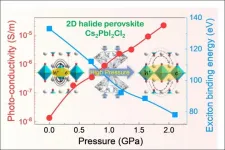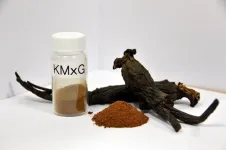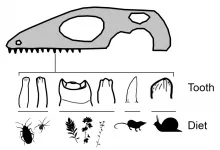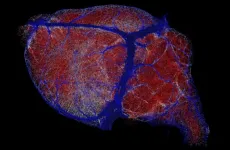Sesaminol: Parkinson's disease's surprise medicine
Osaka City University shows that sesaminol, purified from industrial sesame seed by-product, can help prevent Parkinson's disease.
2021-03-03
(Press-News.org) Sesame seed oil, used by many for its nutty aroma and high burn-point, is made by extracting the fatty oils from sesame seeds, with the empty shells thrown out as waste. In a literal instantiation of the age-old adage "one man's trash is another man's treasure", researchers discovered that a chemical called sesaminol, abundant in this waste, has protective effects against Parkinson's disease.
"Currently there is no preventive medicine for Parkinson's disease", states OCU Associate Professor Akiko Kojima-Yuasa, "we only have coping treatments". Associate Professor Kojima-Yuasa led her research group through a series of experiments to understand the effects of sesaminol on in vitro and in vivo Parkinson's disease models.
Parkinson's disease is caused when certain neurons in the brain involved with movement break down or die due in part to a situation called oxidative stress - neurons in the brain come under extreme pressure from an imbalance between antioxidants and reactive oxygen species (ROS). The team found in cell-based in vitro experiments that sesaminol protected against neuronal damage by promoting the translocation of Nrf2, a protein involved in the response to oxidative stress, and by reducing the production of intracellular ROS.
In vivo experiments brought Associate Professor Kojima-Yuasa's team equally promising results. The impairment of movement due to Parkinson's disease is the result of damaged neurons producing less dopamine than is naturally needed. The team showed that mice with Parkinson's disease models show this lack of dopamine production. However, after feeding the mice a diet containing sesaminol for 36 days, the research team saw an increase in dopamine levels. Alongside this, a rotarod performance test revealed a significant increase in motor performance and intestinal motor function.
With the first-ever medicine for Parkinson's disease potentially being the naturally occurring food ingredient sesaminol, and this ingredient being found in the naturally occurring waste of the sesame seed industry, Associate Professor Kojima-Yuasa and her team are ready to take their work to the clinical trial phase and connect the consumption/production chain in a way that, as she puts it, "prevents diseases with natural foods to greatly promote societal health."
INFORMATION:
We are Osaka City University - the oldest research university in Osaka. With 9 undergraduate faculties and 11 graduate schools all dedicated to making urban life better, energy cleaner, and people healthier and happier, we have won numerous awards and have produced 2 Nobel laureates. For more information, please visit our website at https://www.osaka-cu.ac.jp/en
[Attachments] See images for this press release:
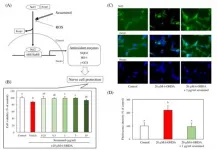
ELSE PRESS RELEASES FROM THIS DATE:
2021-03-03
HPSTAR scientists Dr. Songhao Guo and Dr. Xujie Lü report three orders of magnitude increase in the photoconductivity of Cs2PbI2Cl2 from its initial value, at the industrially achievable level of 2 GPa, using pressure regulation. Impressively, pressure regulating the 2D perovskite's excitonic features gains it 3D compound characteristics without diminishing its own advantages, making it a more promising material for photovoltaic and photodetector applications. Their study is published as a Cover article in the latest issue of the Journal of the American Chemical Society.
Two-dimensional ...
2021-03-03
New research from The University of Manchester has identified various ways in which UK higher education institutions are beginning to tackle emissions associated with business travel and catering. These are two substantial contributors to emissions in this sector, and difficult to decarbonise. The findings suggest need for further sector-wide efforts to tackle the planet's most pressing issue.
This new study, from The University of Manchester's Tyndall Centre for Climate Change and the Centre for Climate Change and Social Transformations (CAST), analysed publicly available policies of 66 UK universities to identify strategies ...
2021-03-03
Red ginseng, which has long been used as an ingredient in traditional Korean medicine, has recently drawn increased attention as a functional material for its health-promoting effects. The composition and activities of red ginseng vary depending on the processing method, and this has become an active area of research. Recently, a research team in Korea has entered the spotlight as they discovered that red ginseng has inhibitory effects against lung cancer metastasis.
The Korea Institute of Science and Technology (KIST) reported that a joint study conducted by Dr. Jungyeob Ham from the Natural Product Research Center at the KIST Gangneung Institute of Natural Products and Dr. Hyeonseok Ko of Seoul Asan Medical Center revealed that two components of red ginseng, ...
2021-03-03
Researchers from the University of Texas, University of Chicago, University of Notre Dame, and London School of Economics published a new paper in the Journal of Marketing that examines whether entrepreneurs in emerging markets can benefit from marketers' help.
The study, forthcoming in the Journal of Marketing, is titled "Do Marketers Matter for Entrepreneurs? Evidence from a Field Experiment in Uganda" and is authored by Stephen Anderson, Pradeep Chintagunta, Frank Germann, and Naufel Vilcassim.
Can marketers help improve the world? While this question may seem vast and unknowable, this new study proposes ...
2021-03-03
BINGHAMTON, NY -- Customized diets and lifestyle changes could be key to optimizing mental health, according to new research including faculty at Binghamton University, State University of New York.
"There is increasing evidence that diet plays a major role in improving mental health, but everyone is talking about a healthy diet," said Begdache, an assistant professor of health and wellness studies at Binghamton University and co-author of a new paper in Nutrients.
"We need to consider a spectrum of dietary and lifestyle changes based on different age groups and gender," she said. "There is not one healthy diet that will work for everyone. There is not one fix."
Begdache, who is also a registered dietitian, believes that ...
2021-03-03
Home health visits change to virtual ones during pandemic
'We don't have to rely on mental health professionals'
As perinatal depression soars during pandemic, there's a growing need for treatment
CHICAGO --- Perinatal depression has soared during the pandemic. But many mental health professionals are overwhelmed and can't take on new clients.
Good news comes from a new Northwestern Medicine study finding paraprofessionals generated similar reductions in depressive symptoms as mental health professionals when delivering a group-based cognitive-behavioral therapy intervention.
The study findings are based on ...
2021-03-03
New research has revealed that the diets of early lizards and snakes, which lived alongside dinosaurs around 100 million years ago, were more varied and advanced than previously thought.
The study, led by the University of Bristol and published in Royal Society Open Science, showed lizards, snakes, and mosasaurs in the Cretaceous period already had the full spectrum of diet types, including flesh-eating and plant-based, which they have today.
There are currently some 10,000 species of lizards and snakes, known collectively as squamates. It was originally understood their great diversity was acquired only after the extinction ...
2021-03-03
Patients with type 2 diabetes that were treated with a weekly injection of the breakthrough drug Semaglutide were able to achieve an average weight loss of nearly 10kg, according to a new study published in The Lancet today.
Led by Melanie Davies, Professor of Diabetes Medicine at the University of Leicester and the Co-Director of the Leicester Diabetes Centre, the study showed that two thirds of patients with type 2 diabetes that were treated with weekly injections of a 2.4mg dose of Semaglutide were able to lose at least 5% of their body weight and achieved significant improvement in blood glucose control.
More than a quarter of patients were able to ...
2021-03-03
Pregnant patients in Colorado may be told about parenting and adoption, but not abortion. This is according to a new study led by Kate Coleman-Minahan of the University of Colorado College of Nursing published in the END ...
2021-03-02
Our brains are non-stop consumers. A labyrinth of blood vessels, stacked end-to-end comparable in length to the distance from San Diego to Berkeley, ensures a continuous flow of oxygen and sugar to keep our brains functioning at peak levels.
But how does this intricate system ensure that more active parts of the brain receive enough nourishment versus less demanding areas? That's a century-old problem in neuroscience that scientists at the University of California San Diego have helped answer in a newly published study.
Studying the brains of mice, a team of researchers led by Xiang Ji, David Kleinfeld and their colleagues has deciphered the question of brain energy consumption and blood vessel density through newly developed maps that detail ...
LAST 30 PRESS RELEASES:
[Press-News.org] Sesaminol: Parkinson's disease's surprise medicine
Osaka City University shows that sesaminol, purified from industrial sesame seed by-product, can help prevent Parkinson's disease.

